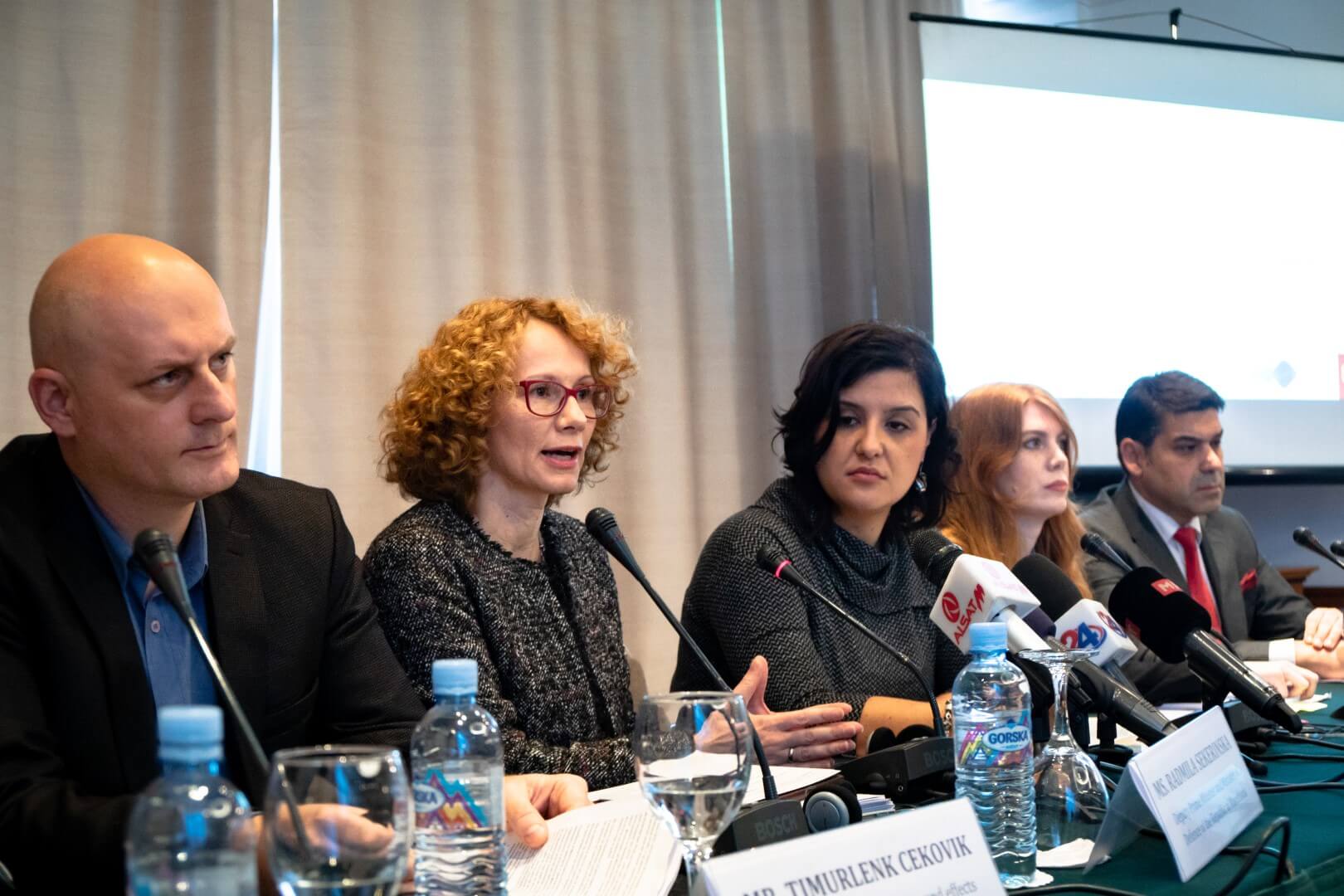Today, the European Policy Institute – Skopje (EPI) at the Holiday Inn Hotel held a debating event and a presentation of research on Macedonia’s accession to NATO, titled “Between facts and fiction – What will NATO integration bring to Macedonia?”. Panelists at the event were the Deputy Prime Minister and Minister of Defense of the Republic of Macedonia, Ms. Radmila Shekerinska, Mile Boshkov from Business Confederation of Macedonia, prof. Dr. Jugoslav Achkoski, from the Military Academy “Gen. Mihailo Apostoloski”, the researchers from the project Mr. Timurlenk Cekovic and Ms. Ivana Velkovska and the Director of EPI, Dr. Simonida Kacarska, as moderator of the event.
In the introductory speech, the Minister of Defense, Ms. Radmila Shekerinska, stressed the importance that these research comes from the civil sector, because it offers a perspective that is different from that of the institutions that closely work on the NATO integration process. In her address, she stressed that NATO and EU membership are complementary activities and that the joint influence of these integration processes will have a positive effect towards improving the economic and political prosperity in the Republic of Macedonia.

The researchers MA Chekovik and MA Velkovska presented their research on the benefits and effects that Macedonia could expect from joining NATO.
The research by Cekovic focuses on the security and political benefits of joining NATO. To this end, among other effects, the benefits of joining a military alliance, the relations of the alliance with Russia, and the impact of NATO membership on improving the Global Peace Index – GPI of its members are analyzed. The research also analyzes the security risks for the Republic of Macedonia, in terms of the Kosovo security issue and the migrant crisis.
The researcher comes to the conclusion that providing peace and security are one of the most important reasons why Macedonia should enter into alliance with other stronger states and draw the economic and security benefits, especially taking into account the risks of non-accession. In addition to the other indicators, the GPI, as a useful and methodologically sound tool for calculating the country’s security risk, clearly shows that 15 NATO countries are among the top 30 best ranked in the world.
In the research on the economic benefits and challenges, Velkovska has made a comparative analysis of Albania, Croatia, Montenegro, Bulgaria, Romania and Macedonia, to determine the budget implications, the effect on GDP and foreign direct investment (FDI), and indicators that relate to good governance.
According to the data from the analyzed countries, the countries had an average GDP increase of 90% over the five years after joining NATO, compared with the five years prior to joining NATO and an average increase in FDI by as much as 292%. However, it cannot be argued that these positive changes are a direct consequence of joining NATO, as the countries are going through the integration processes in the European Union and other enhanced processes of structural reforms. However, the existence of a correlation between these positive changes and NATO membership is encouraging for a potential member state like Macedonia.
Prof. Dr. Jugoslav Achkoski talked about the implemented SIARS project as an important contribution to the civil sector, which enabled the transfer of medical data from the soldiers in the field of war to a command centre, technology which can be used for civilian needs. Achkoski also stressed NATO’s contribution to the development of the civil sector, as well as the importance of NATO membership, especially for small countries like the Republic of Macedonia, which do not have great defense capabilities.
Mr. Mile Bohskov stressed that the NATO agenda, in the sense of the business community, is a business agenda. Accession to NATO will provide space for inclusion of the business community, which will be able to serve the demand from NATO. However, he said that the business community in the Republic of Macedonia would have to seriously understand that more preparations are needed in order to exploit this potential. At the same time, Boshkov stressed that NATO provides stability for doing business and developing the economy in the country.
In a statement to the media, the EPI’s Director Dr. Simonida Kacarska noted that according to the experiences of other countries that joined NATO in the past 10 years, what we can expect is increased economic development and increased inflow of foreign direct investments. However, we need to be careful, because much of those expectations and effects will actually depend on ourselves, on the implementation of domestic reforms and depend on whether we can reform the domestic businesses and the economy.
After the presentation of the research, a debate was opened regarding the benefits and challenges of NATO accession. The event was attended by foreign representatives, representatives from institutions, civil society organizations and representatives from universities.
The event is organized as part of the project “Civic Debate on NATO”, a project implemented by the European Policy Institute – Skopje, financed by the Ministry of Defense. The main goal of the project is to contribute to NATO accession through evidence-based debate and arguments that will improve citizens’ understanding of Macedonia’s NATO membership.

The draft researches are available in Macedonian on the link: http://bit.ly/2G14IM4.






